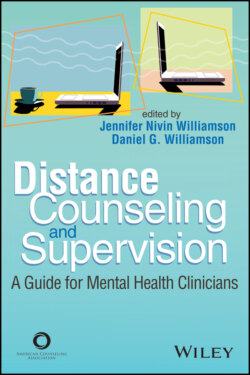Читать книгу Distance Counseling and Supervision - Группа авторов - Страница 10
Chapter 1
Ethical, Legal, and Risk Management Considerations: Understanding the Landscape of Telebehavioral Health and Supervision
ОглавлениеJennifer Nivin Williamson and Daniel G. Williamson
The ACA Code of Ethics (American Counseling Association [ACA], 2014) declares the following in the introduction to Section H:
Counselors understand that the profession of counseling may no longer be limited to in-person, face-to-face interactions. Counselors actively attempt to understand the evolving nature of the profession with regard to distance counseling, technology, and social media and how such resources may be used to better serve their clients. (p. 17)
This section on distance counseling, technology, and social media was among major revisions to the ethical standards and identifies technology as a part of the profession. Counselors have an ethical obligation to understand how new technologies might be used to serve clients and to use them responsibly. The introduction to Section H goes on to caution counselors to recognize the concerns with using these technologies, especially in terms of protecting confidentiality, and to recognize the ethical and legal requirements needed to implement these resources appropriately (ACA, 2014). The primary goal of integrating technology into counseling practice is to enhance human interaction (Association for Counselor Education and Supervision Technology Interest Network, 2007). As counselors engage in technology-assisted mental health services, it is imperative that they consider ethical, legal, and risk management standards in an effort to provide competent care to clients. In instances when the process is not clearly outlined, an ethical decision-making model should be used, the law should be explored, and the appropriate stakeholders should be consulted.
Providing some form of mental health services at a distance is not a new concept. Suicide hotlines have been in existence since the 1950s (Centore & Milacci, 2008), and poet Sylvia Plath continued to connect with her Boston-based psychiatrist after she moved to England by exchanging letters in the 1960s. Although Plath’s life ultimately ended in suicide, she described the letters as a lifeline (Alexander, 2018). This illustrates both the risk and benefit of distance counseling.
In 2014, ACA recognized “the evolving nature of the profession with regard to distance counseling, technology, and social media” (p. 17). In 2016, the National Board for Certified Counselors (NBCC) recognized the impact that computers and technology have had on the counseling profession, drafted a policy regarding the provision of distance services, and developed a distance counseling credential. Multiple terms are used to describe counseling activities that partly or completely use the internet, including “online counseling/therapy, technology-assisted counseling, e-therapy, psychotechnology, behavioral telehealth, distance professional services, internet counseling, cybertherapy, and distance counseling” (Wheeler & Bertram, 2019, p. 172). Harris and Birnbaum (2015) touted the possibility of technological advances to reach tens of millions of individuals who are currently underserved.
Legal and regulatory bodies struggle to keep up with the integration of technology into the profession, as do practitioners. VandenBos and Williams (2000) reported that in a survey of American Psychological Association members, 98% affirmed that they had provided counseling services over the phone. Although the use of technology in counseling and supervision has been present for decades, the use of modern technologies remains hotly debated.
During the 2020 Coronavirus (COVID-19) crisis, technology proved to be an opportunity for maintaining continuity of care, providing emergency services, and coping with the global pandemic. Many governing bodies, including state licensure boards and the U.S. Department of Health and Human Services, temporarily relaxed Health Insurance Portability and Accountability Act of 1996 (HIPAA) regulations in an effort to allow counselors and other mental health professionals to provide mental health services during this emergency (U.S. Department of Health and Human Services, 2020). It is possible that these experiences with online counseling will further expand the use of distance counseling. In addition, counseling supervision was provided via synchronous videoconferencing platforms in universities that traditionally only used face-to-face formats.
